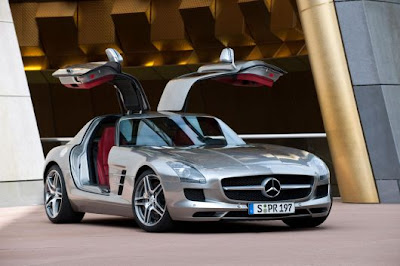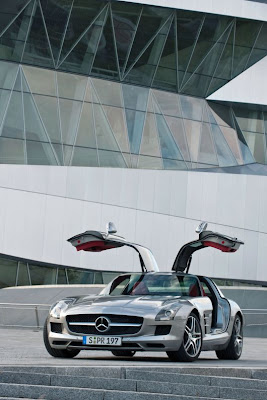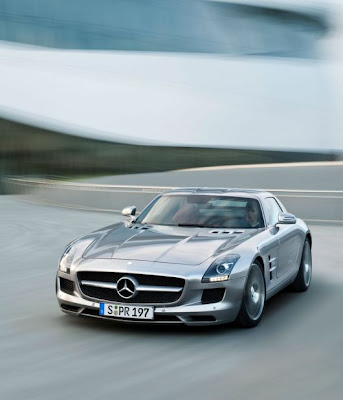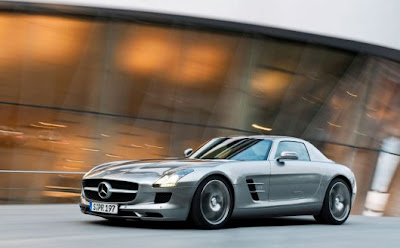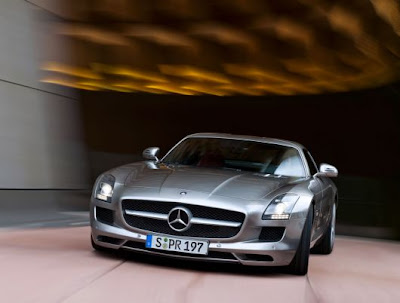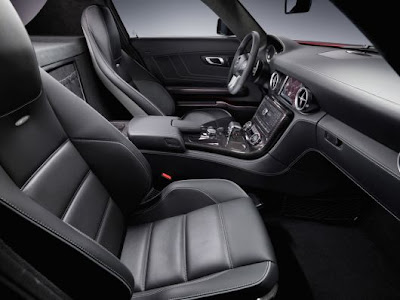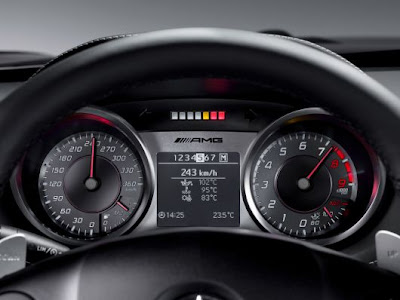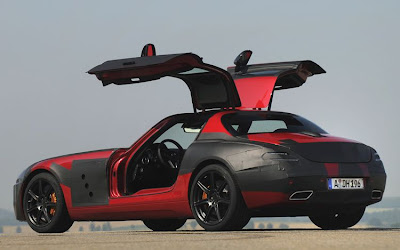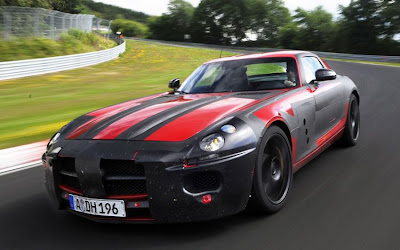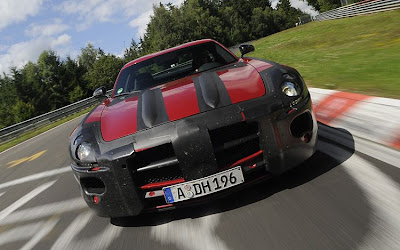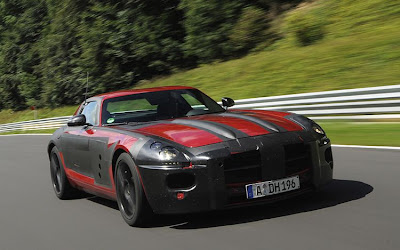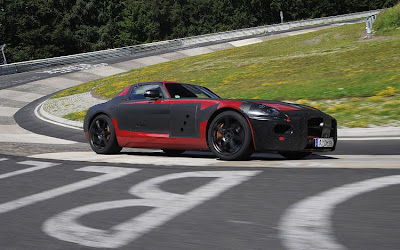Automotive fascination and high tech of the highest order: These are the traits embodied by the new Mercedes-Benz SLS AMG, which is making its world premiere at the International Motor Show (IAA) in Frankfurt/Main on September 15, 2009.
The super sports car boasts a purist design, the systematic incorporation of lightweight engineering and superior handling dynamics. At the same time, the SLS delivers the high everyday utility and exemplary safety that typifies Mercedes, making the new gullwing the ideal synthesis of the strengths of Mercedes-Benz and AMG.
The new super sports car from Mercedes-Benz and AMG dazzles with its unparalleled technology package: an aluminium space frame body with gullwing doors; an AMG 6.3-liter, front-mid V8 engine with a top power of 420 kW/563 hp, 650 Nm of torque (479 lb-ft), and dry sump lubrication; seven-speed dual-clutch in a transaxle configuration; a sports chassis with aluminium double-wishbone suspension; and a DIN kerb weight of 1,620 kilograms (3,571 lbs.). It’s a combination that guarantees supreme handling dynamics. The car’s ideal weight distribution between the front and rear axles (47 to 53 percent respectively) and its low center of gravity emphasize the concept’s pronounced sports car nature. The gullwing accelerates from 0 to 100 km/h in 3.8 seconds (0-60 in 3.6 seconds) and has a top speed of 317 km/h (195 mph) (electronically limited).
“With the new SLS AMG, Mercedes-Benz is presenting a fascinating super sports car that will quicken the pulse of any car fan. The SLS AMG bolsters both the Mercedes-Benz and AMG brands equally, and will surely become one of the most alluring sports cars of our time,” says Dr. Dieter Zetsche, Chairman of the Board of Management of Daimler AG and Head of Mercedes-Benz Cars.
“In the SLS AMG, our customers benefit first-hand from the expertise gleaned by Mercedes-AMG from more than 40 years of motor sports experience. The unparalleled technology package provides for extraordinary handling dynamics with moderate fuel consumption—another hallmark of AMG today,” says Volker Mornhinweg, Chairman of Mercedes-AMG GmbH.
Design: Purist, distinctive, and passionate.
The distinctive design of the new Mercedes-Benz SLS AMG dazzles with its passionate sportiness and reinterprets the breathtaking design of the Mercedes-Benz 300 SL, one of the brightest design icons of the Mercedes-Benz brand. With its purist design, the new SLS AMG reflects the teachings of modern sports car design: The nearly two-meter long-hood, the low greenhouse positioned far back, and the short rear with the extendable rear spoiler symbolize dynamism, as do the long wheelbase, the wide track and the large wheels. The proportions are determined by the short overhangs and the design of the super sports car, with a low-slung, front-mid engine mounted well back and a dual-clutch transmission in a transaxle configuration. The stylistic highlight is without a doubt the gullwing doors, which impart the SLS AMG with incomparable character and make a unique statement in this vehicle segment.
It is not just the gullwing doors that awaken reminiscences of the Mercedes-Benz 300 SL. The characteristic wide radiator grille with the large Mercedes star and the wing-like fin are also reminiscent of the face of the legendary sports car. The three-dimensional, sculptured front with the low, v-shaped front skirt with lateral indentations gives the gullwing a powerful stance on the road. The car’s dominance is underscored by six large air intakes and the wideset, vertical headlamps with intriguing internals: The central bixenon low-beam headlamps with metallic wing element are framed by two LED blinkers above and two LED daytime running lights below.
Influences from aircraft construction. Echoes of aircraft construction are stirred by the exposed Mercedes star, whose cone in profile resembles the air intake of a jet engine, and the long hood. The farther the viewer’s eye wanders to the front, the greater the curvature of the hood. The same visual effect is produced by the design of the four “Silver Shadow” fins gracing the two air vent grilles on the end of the hood. These lines, which are typical for aircraft, also optically accelerate the air flowing past, giving the SLS AMG an extremely dynamic appearance even when standing still.
The fins on the hood are revisited on the vehicle’s flanks. Aficionados will recognize this as another typical styling element of the 300 SL. The “6.3” badge integrated between the fins provides a direct reference to the large displacement, naturally aspirated V8 engine. Extending from the lateral air outlet is a style-defining character line, which together with the convex inclination and the exciting surface treatment combines aesthetics with power. The compact passenger compartment is extremely attractive and unmistakable, and with its high waistline, low side windows and steep windshield resembles a visor. The B-pillar, which is inclined to the front and transitions to the rear window with an elegant curve, gives the impression of pure dynamics.
Muscle and shoulder dominate the side view.
The pronounced shoulder of the SLS, which extends from the front to the rear like a taut muscle, is striking when the car is viewed from the side. The wheel arches that extend powerfully from the sidewall are filled by striking 19-inch (front) and 20-inch (rear) light alloy wheels. Three different styles of wheels all provide a view of the large, AMG high-performance composite brakes. When viewed from above, an unbroken line extends along the muscle from the headlamps to the rear. This stylistic device is also found on the hood, where the eye follows a striking contour extending over the roof between the gullwing doors to the third brake light.
Rear view with wide appeal.
The rear view of the SLS suggests dynamics and power. The gently sloping boot lid, the pronounced shoulder and the flat tail lights all give the car a wide appearance. Sporting LED technology, the horizontally split lights provide interesting insights. LED lighting elements in the shape of a wing impart a fascinating and distinctive night design. The LED fog lamp/backup light is mounted low and in the middle, Formula 1 style. The black diffuser insert and the two chrome tailpipe baffles of the sports exhaust system are also inspired by motor sports. The sharp indentations of the rear skirt allow a clear view of the wide rear tires and give the gullwing a self-assured road stance. The spoiler integrated into the boot lid extends automatically at a speed of 120 km/h (74 mph) and provides outstanding stability at high speeds.
New colors: “AMG Alubeam silver” and two matte paints.
The color palette for the SLS comprises a total of nine exclusive shades. The highlight is the unique “AMG Alubeam silver” paintwork. The process used nowhere else in the world, lets the paint shine like liquid metal. The paint covers the body like a metallic skin, emphasizing the gullwing’s fascinating design lines more strongly than any other paintwork and makes them livelier by means of targeted light reflections. This effect would not be possible without tiny pigments measuring 30 to 50 nanometers. The matte paints “designo magno Alanite Grey” and “AMG magno Sylvanite Grey” are just as attractive. Their silk matte surface emphasizes the sporty character of the two-seater by sharply defining the contours of the edges.
Interior with aircraft design elements and racing functionality.
Drivers who raise the gullwing doors of the Mercedes-Benz SLS AMG and sit down in the sports seats will experience a very special interior. In its conception, the Mercedes-Benz designers took their cue from aircraft construction to create an ambience that immediately evokes associations with plane cockpits. The defining stylistic element is the dashboard, whose powerfully extended wing-like profile creates the impression of great width. The dashboard incorporates “silver shadow” electroplated air vents with an adjustable set of nozzles, whose shape vividly calls to mind jet engines. The instrument cluster with its shift-up LED display and two white illuminated circular instruments also appears very sporty in the metallic silver shadow look. The silver dials have red pointers and a 220-mph scale. The main feature between the dashboard’s two center air vents is the COMAND APS multi-media system with its 7-inch screen. The elongated center console made of real matte metal also takes up the plane cockpit theme. Among other things, the center console incorporates the AMG DRIVE UNIT, which is aligned towards the driver’s seat and enables SLS owners to customize their vehicle set-up. The AMG SPEEDSHIFT DCT 7-speed sports transmission is operated by means of the E-SELECT lever, which is styled like a jet’s thrust regulator. All of the control elements are of real metal, boasting a shiny silver shadow surface.
The cockpit impression is rounded off by the concave interior trim of the gullwing doors, the high waistline clearance and the muscular side skirts, all of which also convey the feeling of sports car ergonomics. The high craftsmanship of the SLS interior is demonstrated by the use of refined materials such as nappa leather, real metal, and, as an option, real carbon appliqués. All of these features also express a great attention to detail. To help customize the interior, the leather is available in five designo colors: black, classic red, sand, porcelain and light brown.
Wide-opening gullwing doors for easy entry.
Despite the low seating position typical of sports cars, which means the seats are located only 369 millimeters (14.5 inches) above the road surface, the wide opening gullwing doors ensure easy entry and exit. The designers made sure that the doors had as large an opening angle as possible, which is why they swing up by 70 degrees. Another consideration that is just as important is that the distance between the opened doors and the road surface is an ample 1.50 meters (60 in.), while the size of the passage between the opened doors and the upper edge of the side skirts is a generous 1.08 meters (43 in). By contrast, the entry height (the distance between the road surface and the upper edge of the side skirts) is a low 45 centimeters (17 in). Another important criterion for ensuring an elegant entry and exit is that the opening and closing of the doors requires little effort even when it’s very cold, because of two gas-dampers next to the door hinges.
The gullwing doors require less room to open than do conventional coupe doors and can be completely opened in standard sized garages. The gullwing doors can be opened from the interior by means of a silver shadow opening handle. Thanks to the linkage system in the door’s armrest, the door is easy to handle when closing. The buttons for the power windows, the central locking system and the exterior mirror adjustment are also easily accessible in the interior trim. The interior has a spacious feeling, due primarily to the large shoulder room of 1483 millimeters (58.4 inches) and the wide elbow width of 1606 millimeters (63.2 inches). In conjunction with the generous headroom of 990 millimeters (39.1 inches) and the driver’s effective legroom of 1058 millimeters (41.7 inches), the deep seating position is also relaxing. The passengers benefit from a relatively steep windscreen that provides a good view.
Sports seats with magnesium backrests.
The backrests of the sports seats are made of magnesium, a high-tech material that is strong as well as light. This results in substantial benefits with regard to the vehicle’s weight balance and the lowering of its center of gravity. The sports seats have two-zone seat cushions. Large side bolsters filled with harder foam ensure optimum lateral support, while the inner zones of the seats and backrests have purposefully been made softer for high long-distance driving comfort.
The Memory Package enables the user to electrically adjust the seat’s lateral position and height as well as the tilt of the backrest, seat cushion, and steering column. In addition, the package allows the user to save up to three individual settings.Four-way lumbar supports provide effective support for the spine, while adjustable side bolsters in the backrests substantially improve lateral support when driving around bends at high speeds. Other standard features include a three-stage seat heating system as well as seat occupancy and child safety seat detection for the front seat passenger.
The sports seats with integrated headrests and sporty transverse piping are covered with designo leather. Two-tone seats are also available in the colours classic red, sand and porcelain. Cars with the interior color light brown use natural leather with especially high quality braided leather for the center insert of the seats. Depending on the color combination selected, the sporty feeling is further enhanced through the use of contrast piping.
The three-spoke performance leather steering wheel with a 365-millimeter (14 in) rim, gearshift paddles and a real metal accent emphasize the vehicle’s authentic hand-crafted character and provide the best possible assistance in maintaining control of the car.
Multiple stowage spaces for ensuring the car’s suitability for everyday use that is a hallmark of Mercedes.
Other impressive features of the SLS AMG interior are conveniently designed stowage areas for ensuring the car’s suitability for everyday use that is a hallmark of Mercedes. The dashboard on the front passenger’s side contains a 3.7-liter (225 in3) glove compartment and a storage bin for glasses. To the right of the E-SELECT lever, passengers will find a small stowage area with a 12 volt socket or an ashtray with a lighter. The armrest behind the center console not only serves for operating the COMAND controller; it can also be shifted in two stages at the push of a button to provide access to a storage bin located underneath. Here, users will find two cup holders and the recess for the telephone (optional equipment).
Additional storage space is provided by the stowage system between the seats at the back and the mesh side pocket in the front passenger footwell. Two clothing hooks are fixed to the backrests. Their counterparts in the roof lining can be folded out and have silicone damping.
The button for unlocking the rear hatch can be found underneath the light switch. In addition, the hatch can also be opened by using the car keys. The luggage compartment has a volume of 176 liters (6.2 ft3).
The SLS’ extensive range of standard equipment includes (excerpts):
• COMAND APS
• Floor mats with AMG logo
• designo leather for interior appointments
• Burglary and theft warning system
• Electric parking brake
• Headlamp Assist
• KEYLESS-GO start function
• PARKTRONIC
• Rain sensor
• Heated sports seats
• Sports pedals made of brushed stainless steel with rubber studs
• Cruise control with SPEEDTRONIC
• THERMOTRONIC
• Memory Package with power-adjustable seating and steering wheel settings
Optional extras include the following:
• 6 disc DVD changer
• Bang & Olufsen BeoSound AMG surround sound system
• One-tone exclusive designo leather for interior appointments
• Two-tone exclusive designo leather for interior appointments
• Exclusive designo light brown natural leather/braided leather for interior appointments
• AMG Alubeam Silver paintwork
• AMG magno Sylvanite Grey paintwork
• AMG magno Alanite Grey paintwork
• Media interface
The AMG Performance Studio also offers its full range of top-quality features for meeting individual customer preferences for the SLS AMG:
• Carbon exterior mirrors
• Carbon hood
• Carbon ornamental trim (for front and rear storage bins and lids, cover for AMG DRIVE UNIT, covers for the cluster gears and rear of the centre console, ornamental trim for the centre console and the door armrests)
• Interior Carbon Package (carbon ornamental trim, side panels for backrests and seats, door sills)
• Performance chassis with uprated tuning for optimised dynamic transverse movement
• Forged 10-spoke wheels
• Performance sports steering wheel covered with leather/Alcantara
Aluminium space frame for light weight and highest strength.
The SLS is also taking a new approach in its body concept. For the first time ever, Mercedes-Benz and AMG are presenting an automobile, whose chassis and body are made of aluminium. This leads to significant weight savings compared to the traditional steel construction, as shown by the car’s DIN kerb weight of only 1,620 kilograms (3,571 lbs.).
The vehicle’s all-new body consists of an aluminium space frame, which combines intelligent, lightweight design with the highest strength and thus further boosts the SLS’ excellent handling properties. Light aluminium profiles combine the force nodes to create a stable structure. The large, low-lying cross-sections of these aluminium profiles exhibit high resistance torques, thereby ensuring the desired direct transfer of drive, braking and chassis forces. Undesired flexibility is reduced by the structure; the vehicle responds rigidly, directly and as if it was almost free of torsion.
The intelligent aluminium space frame, which has been optimized in terms of weight, is 45 percent aluminium profiles, 31 percent aluminium panelling, 20 percent cast aluminium and four percent steel. Ultra high-tensile, hot-rolled steel is used in the A-pillars to further improve occupant protection. The body-in-white weight is 241 kilograms (531 lbs.) — and given that the maximum power is 420 kW/563 hp, guaranteeing top performance.
Lower center of gravity and transverse reinforcing struts for perfect dynamics.
The overall vehicle concept has been designed with the lowest possible center of gravity. That means a low connection between the drive train and the axles, as well as the lowest possible arrangement of the body-in-white components that contribute to rigidity. Examples include the connections between the front and rear sections and the occupant safety cell, which are resistant to bending and torque. These connections have been consistently designed to run along the lowest possible force paths.
The result is not only a low center of gravity but also a harmonious, and thus efficient, transfer of force within the vehicle’s structure.
Another hallmark of the lightweight construction is the transverse reinforcing struts that are integrated into the body-in-white structure at the front and rear axles. The profiles connect the side members exactly at the points where the strongest forces act on the body-in-white when the vehicle is taking a fast bend. The advantages of this painstaking solution are a matchless degree of transverse rigidity and the avoidance of heavy secondary stiffeners or consoles.
Passive safety at the highest level.
The aluminium space frame forms the basis for providing outstanding passive safety. The comprehensive range of standard equipment includes three-point seatbelts, seat-belt tensioners, belt force limiters, and eight airbags (adaptive front airbags, a kneebag each for the driver and front passenger, two sidebags integrated into the seats and two windowbags that trigger out of the door).
Advanced AMG 6.3-liter V8 engine with an output of 420 kW/563 hp.
The heart of the new SLS is a high-powered eight-cylinder engine manufactured by Mercedes-AMG. The advanced 6.3-liter V-8 engine, which has an output of 420 kW/563 hp at 6,800 rpm, makes the gullwing vehicle one of the most powerful sports cars in its segment. In conjunction with the low vehicle weight, this results in a weight-power ratio of 2.84 kg/hp (5.5 lb/hp). The naturally aspirated engine provides its maximum torque of 650 Nm (479 lb-ft) at 4,750 rpm. The gullwing vehicle accelerates from 0 to 100 km/h in 3.8 seconds (0-60 in 3.6 seconds) and has an electronically limited top speed of 317 km/h (195 mph) (all figures are preliminary). The high-torque V8 engine, which is called the M159 within the company, has a displacement of 6,208 cm³. It has been completely restructured compared to the basic M156 engine, and it displays the typical characteristics of high-performance racing engines.
The most important measures taken to boost its performance were the development of a completely new intake manifold system, the restructuring of the valve gear and the camshaft, the use of streamlined steel-pipe fan-type exhaust pipes and a dethrottling of the exhaust system. As a result, the designers have achieved significantly improved cylinder charging that boosts performance by almost nine percent. The eight-cylinder engine reacts nimbly to movements of the accelerator pedal and in general responds extremely well. Thanks to the change to dry sump lubrication, it has been possible to achieve a much lower installation position for the engine. The consequent lowering of the vehicle’s center of gravity enables high transverse acceleration, which results in handling dynamics that drivers love.
The perfect synthesis of lightweight construction and stability.
The use of high-strength components compensates for the increased burden on the engine resulting from its higher output. Forged pistons, a strengthened crankshaft mounting, an optimized crankcase structure, and improved lubrication by means of a need-regulated high-powered oil pump ensure maximum stability. In spite of the increased demands placed on it, the engine weight of the M159 has been further reduced. The forged pistons, as oscillating masses, make a particularly valuable contribution to this reduction. This results in a dry weight of 205 kg (451 lbs), and thus a weight-power ratio of 0.36 kg/hp (0.79 lb/hp) — a value that is unmatched by any competitors. Sophisticated catalytic converter technology makes it possible to comply with current and future emissions limits such as EU5, LEV2 and ULEV.
Reaching ambitious fuel consumption targets.
In spite of its uncompromisingly sporty character, the vehicle has reached ambitious fuel consumption targets. The SLS AMG consumes 13.2 liters of fuel per 100 km (combined; preliminary Euro figure), which makes it the front runner in its competitive field. It boasts efficiency-boosting measures such as the AMG-exclusive, friction-optimised LDS cylinder-bore lining, an oil supply that is regulated according to the characteristic map, and smart alternator management. During every coasting phase of the vehicle and every braking action, kinetic energy is used to charge the battery rather than being uselessly transformed into heat, as happens in conventional engines. Conversely, the alternator is switched on without a load during acceleration and thus eases the burden on the engine.
Dual-clutch transmission in the transaxle configuration with the Torque Tube.
The AMG 6.3-liter V-8 engine transmits its tremendous power to the rear axle via an especially lightweight drive shaft made of carbon — similar to the DTM C-Class touring car. The dual-clutch transmission is located on the rear axle (in line with the transaxle principle) and is tightly connected with the engine housing by means of a Torque Tube. In the Torque Tube, a carbon camshaft rotates with the same speed as the engine. The advantages of this sophisticated solution include the rigid connection between the engine and the transmission, which results in an optimal response to forces and torques.
The new AMG SPEEDSHIFT DCT seven-speed sports transmission is responsible for the power transmission. This dual-clutch transmission is characterized by quick shifting without any interruption of traction — minimum speeds of 100 milliseconds are possible. The driver has a choice of four different driving programmes: C (Controlled Efficiency), S (Sport), S+ (Sport plus) and M (Manual), as well as a RACE START function. During the Sport, Sport plus and Manual driving programmes, the automatic double-declutching function is active; all of these modes can be comfortably managed via the torque regulator in the AMG DRIVE UNIT. Optimal traction is guaranteed by the mechanical differential lock, which is integrated into the compact transmission housing.
Sophisticated chassis layout with double wishbone suspension.
The solution that was chosen, a front-mid engine plus transaxle configuration, ensures an ideal weight distribution of 47 percent in the front and 53 percent in the rear. Mounting the engine behind the front axle provided optimal conditions for perfect handling dynamics with precise steering behaviour, top class agility, low inertia during sudden changes of direction and outstanding traction. The aim of Mercedes-Benz and AMG — to build a desirable super sports car and combine flawless race circuit performance with the long distance comfort typical of Mercedes — led to a sophisticated chassis layout. All four wheels are guided on dual A-arms with track rod, a technique that has proven itself in motor racing up to the Formula 1 level. In a double wishbone suspension, the wheel location and suspension function are separated from each other, and the spring struts/damper struts are supported on the lower transverse link. With its high shatter strength and directional stability, the double wishbone concept decisively controls the wheel, with minimal springy movements, and gives the driver optimal contact with the road surface even in extreme situations.
The A-arms, steering knuckles and hub carriers at the front and rear axles are made entirely of forged aluminium — which helps to substantially reduce the unsprung masses; and this in turn improves the responsiveness of the suspension. At 2,680 millimeters (105.5 inches), the long wheelbase results in not only a stable straight-line stability, but also a low dynamic wheel load shift, this significantly reduces the vehicle’s tendency to roll during acceleration and deceleration. The wide tread — 1,682 millimeters (66.2 inches) in the front, and 1,653 millimeters (65.1 inches) in the rear — ensures a lower dynamic wheel load transfer from the inside wheel to the outside wheel on bends, which gives the tires more grip. When driving around bends, the big castor angle of 11.5 degrees results in a large increase in the negative camber, in addition to improving the tires’ grip — and lending high stability when braking suddenly in bends.
Direct steering, differential lock and three-stage ESP®.
With a constant mechanical gear ratio of 13.6: 1, the rack-and-pinion steering gear delivers a consistently direct steering feel, thereby meeting drivers’ high expectations of a super sports car. The parameter power steering works with speed-dependent support and improves feedback for the driver as driving speed increases, a crucial factor when driving straight ahead at high speed. The mounting of the steering gear in front of the engine, on the frametype integral support, allows a particularly low engine position. The gullwing car features a 3-stage ESP®, giving the driver a choice of the three modes “ESP ON”, “ESP SPORT” and “ESP OFF” at the push of a button. Even in “ESP OFF” mode, simply applying the brake pedal makes all ESP functions accessible again.
The traction logic of the acceleration skid control ASR is active in all three ESP modes. If a drive wheel begins to lose traction, a targeted activation of the brakes supplies a considerable improvement in traction — especially in combination with the mechanical multiple-disc limited-slip differential lock, which is standard equipment. During particularly dynamic driving, this allows more effective transfer of the engine output to the road.
AMG high-performance, ceramic-composite brakes, new “flow forming” wheels.
The AMG high-performance composite brakes on the front axel ensure the vehicle quickly comes to a stop even under an enormous load. Even better braking performance is provided by the newly developed, optional ceramic-composite brake system with larger brake discs. Thanks to their increased hardness, the ceramic brake discs offer greater safety at high temperatures and are also impressive by virtue of their weight, which has been reduced by about 40 percent. Through the reduction of the unsprung masses, they further optimise the gullwing’s handling — which becomes especially apparent during motorway driving around bends at high speed.
Lightweight engineering also played a key role with regard to the wheels:
Weight-optimised AMG light alloy wheels in accordance with the new “flow forming” principle, 9.5 x 19 inches in the front, and 11.0 x 20 inches in the rear, reduce the unsprung masses and boost handling dynamics and suspension comfort. In addition to the standard AMG light alloy wheels with a seven-spoke design, customers can choose as options wheels with five double-spokes or forged wheels in a ten-spoke design. Tires developed exclusively for the SLS AMG — 265/35 R 19 in the front, and 295/30 R 20 in the rear, ensure top performance. The standard equipment includes a tire pressure monitoring system that continuously checks the pressure of all four wheels and displays the individual values for each tire.
The reinterpretation of the legendary gullwing will celebrate its U.S. market launch in spring of 2010.
*Provisional figures.
Mercedes-Benz SLS AMG
• Engine
No. of cylinders/arrangement 8/V, 4 valves per cylinder
Displacement cc 6208
Bore x stroke mm 102.2 x 94.6
Rated power output kW/hp 420/563 at 6800 rpm
Rated torque Nm 650 at 4750 rpm (465 lb-ft)
Compression ratio 11.3 : 1
Mixture preparation Microprocessor-controlled fuel injection, HFM
Power transmission
Drive Standard drive
Transmissions AMG SPEEDSHIFT DCT seven-speed sports transmission
Ratios
Final drive – 3.67
1st gear – 3.40
2nd gear – 2.19
3rd gear – 1.63
4th gear – 1.29
5th gear – 1.03
6th gear – 0.84
7th gear – 0.72
Reverse – 2.79
• Chassis and suspension
Front axle Aluminium double wishbone suspension, anti-dive, coil springs, gas-filled shock absorbers, stabiliser
Rear axle Aluminium double wishbone suspension, anti-squat and anti-dive systems, coil springs, gas-filled shock absorbers, stabiliser
Braking system Composite disc brakes, internally ventilated and perforated at the front; disc brakes, internally ventilated and perforated at the rear; electric rear parking brake; ABS; Brake Assist; 3-stage ESP®
Steering Rack-and-pinion power steering with parameter function, steering damper
Wheels Front: 9.5 J x 19; rear: 11 J x 20
Tires Front: 265/35 R 19; rear: 295/30 R 20
Dimensions and weights*
Wheelbase mm 2680
Tread front/rear mm 1682/1653
Overall length mm 4638
Overall width mm 1939
Overall height mm 1262
Turning circle m 11.9
Trunk capacity** l 176
Kerb weight acc. to DIN kg 1620
Payload (basis ready-to-drive according to EC) kg 240
Perm. gross vehicle weight kg 1935
Tank capacity/incl. reserve l 85/14
Performance and fuel consumption*
Acceleration 0-100 km/h s 3.8
Top speed km/h 317***
Fuel consumption NEDC comb. l/100 km 13.2
CO2 emissions g/km 314
* provisional figures; ** according to VDA measuring method; *** electronically limited

